Free
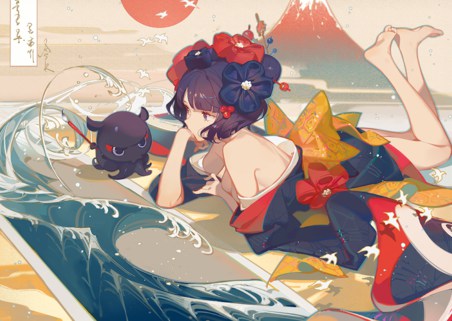
- 21 lessons
- 0 quizzes
- 96 week duration
-
Lessons
- Lesson 1: 一二三四五
- Lesson 2: 六七八九十
- Lesson 3: 百千万人子
- Lesson 4: 男女父母先
- Lesson 5: 生友目口耳
- Lesson 6: 手足力学校
- Lesson 7: 会社駅店入
- Lesson 8: 出電車時間
- Lesson 9: 毎週年今明
- Lesson 10: 午白黒上下
- Lesson 11: 左右前後中
- Lesson 12: 外東南西北
- Lesson 13: 日月火水木
- Lesson 14: 金土山川空
- Lesson 15: 気花天雨牛
- Lesson 16: 馬魚貝英語
- Lesson 17: 国本大小新
- Lesson 18: 古高安多少
- Lesson 19: 長早行来食
- Lesson 20: 飲書見言立
- Lesson 21: 話読買聞休
Lesson 17: 国本大小新

In this lesson, you can learn five N5 kanji: 国本大小新.
Reading & Meaning of 国本大小新:
| Kanji | Meaning | Kunyomi | Onyomi |
| 国 | country | くに | こく |
| 本 | origin; book | Not often used | ほん |
| 大 | big | おお | だい、たい |
| 小 | small | ちい、こ、お | しょう |
| 新 | new | あたら、あら | しん |
How to write 国本大小新:
| Kanji | Stroke Order |
| 国 | 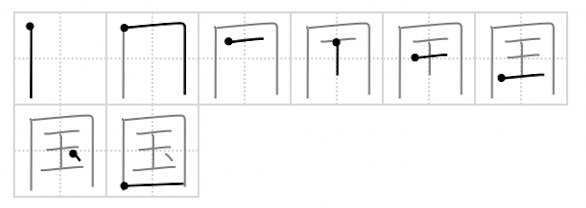 |
| 本 |  |
| 大 | 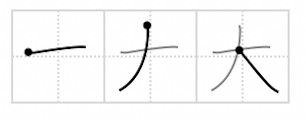 |
| 小 | 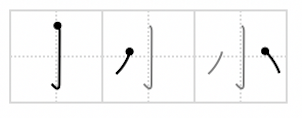 |
| 新 | 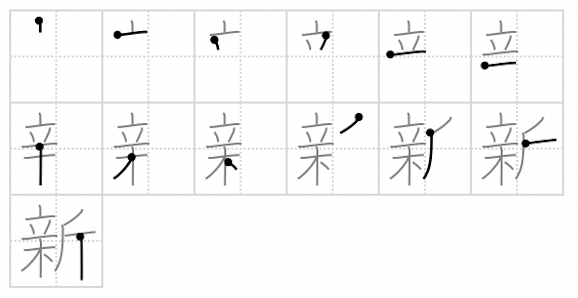 |
Words of 国本大小新:
| Kanji | Words |
| 国 | 国(くに):country 外国(がいこく):foreign country 国際(こくさい):international 中国(ちゅうごく):China 国家(こっか):country |
| 本 | 本(ほん):book 本棚(ほんだな):bookshelf 日本(にほん):Japan 日本語(にほんご):Japanese language 本来(ほんらい):originally |
| 大 | 大きい(おおきい):big 大学(だいがく):university 大変(たいへん):very; tough 大丈夫(だいじょうぶ):fine 大人(おとな):adult【Special Reading】 |
| 小 | 小さい(ちいさい):small 小説(しょうせつ):novel 小鳥(ことり):little bird 小川(おがわ):stream 最小(さいしょう):minimum |
| 新 | 新しい(あたらしい):new 新聞(しんぶん):newspaper 新た(あらた):new 新規(しんき):new 新人(しんじん):rookie |
Example Sentences of 国本大小新:
| 中国では、旧暦にしたがって正月を祝う。 In China, they celebrate New Year by the lunar calendar. 彼女の願いはいつか外国に留学することだ。 Her wish is to study abroad someday. 問題はどこでその本を買うかです。 The question is where to buy the book. この本棚は組み立てが簡単だ。 This bookcase is easy to assemble. 僕の靴は君のより大きい。 My shoes are bigger than yours. 彼はこの春東京大学に入学した。 He entered the University of Tokyo this spring. 彼女は小さい声で話した。 She spoke in a small voice. 僕は寝る前に探偵小説をよく読んだものだった。 I used to read detective stories before sleeping. 彼らは新しい方法を発見した。 They found out a new method. 彼らは新規事業を始めた。 They started a new business. |
Patron-only Contents:

This website won’t exist without Patrons’ support since it’s completely ad-free.
So I made some special contents for Patrons.
It’s a way of saying thank you!
Prev
Lesson 16: 馬魚貝英語
Next
Lesson 18: 古高安多少